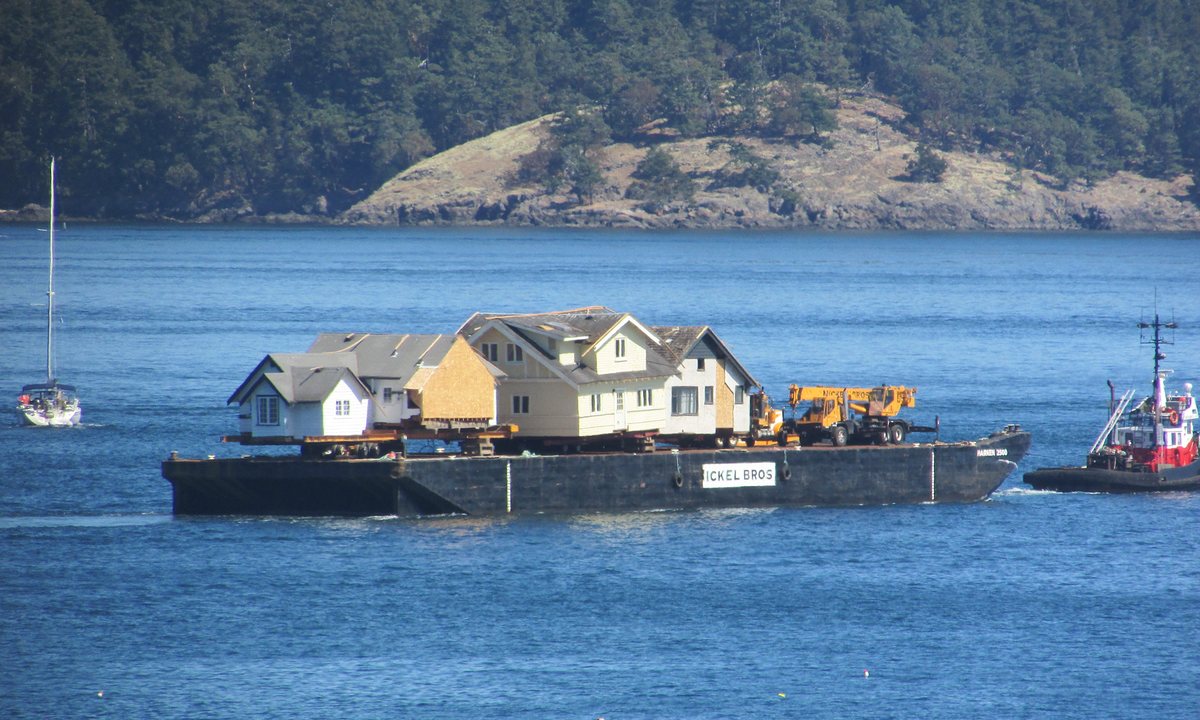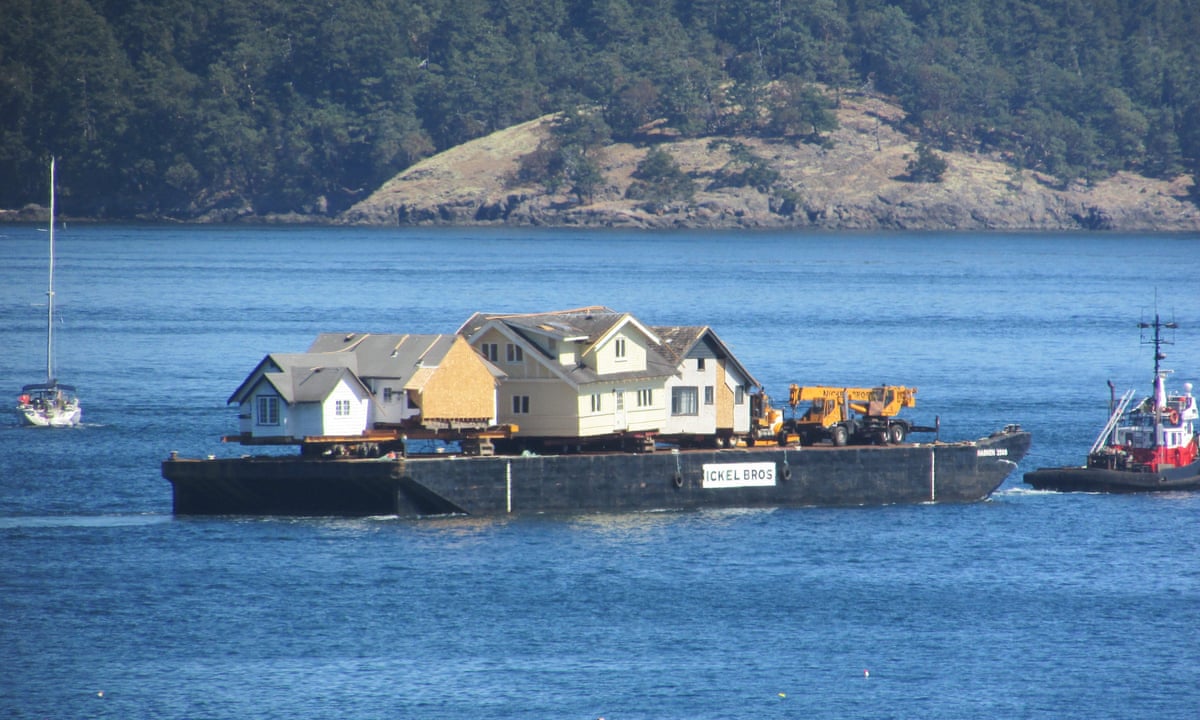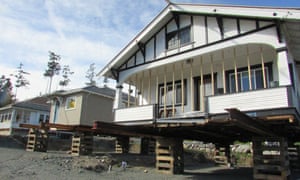How Washington is creating affordable housing with recycled Canadian homes

Heritage homes from Victoria are being shipped to nearby San Juan island even as the Vancouver areas rising real estate prices push residents out

On a sunny day in August, three small homes floated across the waters of the Haro strait, their gray rooftops bobbing as the barge they sat on slowly made its way across the channel of water in the Pacific north-west, crossing the Canadian border into the US.
Each of the homes had been built between 1910 and 1930 in the seaside community of Oak Bay, near Victoria in Canada. But as deep-pocketed developers and buyers flush with cash moved to the area with demands for bigger, more modern housing, the three heritage homes had been cast aside.
Now they were on their way to become part of a new community of permanent affordable housing. Not in Oak Bay, but in Washingtons San Juan island.
In the past 10 months, seven homes have been brought by barge to the island by a group focused on affordable housing. Their hope is to bring five more homes, once the necessary funds are raised.
Were very appreciative, said Nancy DeVaux of the San Juan Community Home Trust. We really like the fact that they have a lot of character and that were keeping the homes out of the landfill.

Since launching in 2001, her group has been behind the construction of more than two dozen new affordable homes on the island. When they were hashing out plans to create a new community on part of a five-acre plot of land, they decided to explore the possibility of recycled homes.
The search brought them to Victoria, home to a mix of character and heritage homes. I do think there are people who have expressed sadness at losing the historical homes and the character houses that have made that area unique, said DeVaux.
The average cost of the recycled homes including moving them to the island runs about $75,000 (C$98,000), with another $145,000 put into each house for renovations, utility hookups and whatever else required to ready the homes to be lived in. The total cost, said DeVaux, runs slightly less than a new build.
In June the first trio of houses will be ready to be sold for between $158,000 and $210,000. Theyll go to residents of the island who meet the home trusts threshold for low income: a single person who earns less than $38,000 and families with an income below $54,000. In order to keep the home permanently affordable, the resale price of the home is restricted.
Another 30 households on the island are on the not-for-profit groups waiting list for affordable housing, a reflection of a cost of housing that ranks among the highest in the state, second only to Seattle. We have a polarized community economically, said DeVaux. Its said that people who live here either have three houses or three jobs.
In a telling sign of the power imbalance that exists between the two groups, much of the new community of affordable housing has been funded by the same wealthy owners whose demand for second homes has driven up the cost of housing on the island.
Similar power dynamics are at play across the Haro strait, but with a notable difference. All of us are very happy that these houses are going to a new life somewhere, said Cairine Green, a former Oak Bay councillor who now chairs the municipalitys heritage commission. But its a sad irony. Oak Bay is providing the affordable houses through recycling them, yet we cant put affordable housing in our own community.
Housing prices in Oak Bay have spiked in recent years as buyers rebuff Vancouver and its heated housing market in favor of Oak Bays tree-lined streets. Now younger families that cant afford to live in [the city of] Vancouver are spilling over to Vancouver island, said Green. Others are selling their homes in Vancouver, where the average price of a detached home in the region soared to a high of C$1.83m in January, and choosing to put down roots in places such as Oak Bay where buyers can get more for their money.
The influx has sparked an increase in the number of yellow backhoes and hard hats in Oak Bay. If you have a bungalow which six months ago was worth C$600,000, they buy it, tear it down and build a house that is worth at least twice as much, said Green. Were not only losing these character houses, but the affordability factor is being pushed out of sight as well.
In this frenzied cycle of buying, demolition and rebuilding, recycling homes has become a means of saving them. Last year 33 homes were demolished or removed, said Green, a microcosm of a trend seen across the region. In the Victoria area an estimated 350 homes were demolished last year, while the city of Vancouver issued an average of 940 demolition permits a year since 2012.
Were dealing right now with a demolition crisis, which is continuing unabated and has been increasing in volume for the last 30 years, said Jim Connelly of the Nickel Bros, the house moving company that barged the seven houses from Victoria and Oak Bay to San Juan island. Some tear down the houses because they want more space or a different architectural style; others are simply reflecting an increasingly common mindset, he said. Anything thats older, we perceive it to be garbage.
As the cost of demolitions rise, the company has seen increasing interest among owners in donating their homes to be recycled. But time remains a significant barrier: a demolition permit can be had in just 48 hours, while the necessary permits to move a house can take up to a month.
Little by little, said Connelly, things are changing. Public opposition to demolitions has been growing in the Vancouver area, with petitions and protests organised to save homes from the wrecking ball. People are getting sick and tired of seeing buildings that have been in their neighborhoods and that theyve grown up with and which are perfectly sound, usable and safe for continued for use destroyed.
In Oak Bay, where residents are increasingly becoming used to demolitions and heritage homes carried away on barges, Green is urging the municipality to provide incentives for people to restore and retain older homes. All kinds of people need to come into Oak Bay, we need that diversity to remain vibrant, she said. Once all the older character houses that are less expensive are gone, well have a real housing issue.